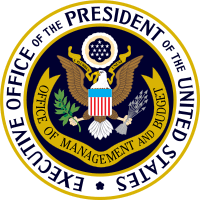Herbert Lord
| General Herbert M. Lord | |
|---|---|
 | |
| 2nd Director of the U.S. Bureau of the Budget | |
|
In office July 1, 1922 – May 31, 1929 | |
| Preceded by | Charles G. Dawes |
| Succeeded by | Clawson Roop |
| Personal details | |
| Born |
December 6, 1859 Rockland, Maine |
| Died |
June 2, 1930 (aged 70) Washington, D.C. |
| Political party | Republican |
| Alma mater | Colby University |
| Military service | |
| Service/branch | United States Army |
| Rank | Brigadier General |
Herbert Mayhew Lord (December 6, 1859 – June 2, 1930) was director of the United States Bureau of the Budget (now the Office of Management and Budget) from July 1, 1922, to May 31, 1929, during the administrations of presidents Warren G. Harding, Calvin Coolidge, and Herbert Hoover.
Early life
He was originally from Maine, and he graduated from Colby College in Waterville, Maine, in 1884.[1] He worked for newspapers during and after graduation in such locations as Rockland, Maine; Denver, Colorado; and Tennessee. He also served as a congressional aide, working as the Chief Clerk of the Ways and Means Committee during the passage of the Dingley Tariff Bill, named for Chairman Nelson Dingley.
Military career
During the Spanish–American War, he joined the United States Army as a Major and Paymaster of Volunteers, and he was commissioned in the Regular Army near the end of the war.[2]
During World War I, he managed the finances for the Quartermaster Corps and was eventually promoted to Director of Finance, controlling the approximately $24 billion appropriations for the War Department. He was awarded the Distinguished Service Medal for his services, and he rose to the rank of Brigadier General before retiring on June 30, 1922, to accept the appointment as Director of the U.S. Bureau of the Budget, succeeding the bureau's first director Charles G. Dawes.[3]
Civilian career
Lord worked very closely with President Coolidge on cutting the federal government budget, meeting with him weekly.[4] He became known for strictness and creativity in cutting the budget as well as attention to detail. Lord chided the US army for purchasing 200,000 new brooms when old ones were available, instructed government departments to write fewer and shorter letters, and saved on transportation costs by using lighter official government paper.[5] Lord and Coolidge succeeded in lowering the federal spending from around $3.2 billion in 1923 to $3.053 billion in 1924.[6] Lord's efforts helped in allowing the federal government to run a surplus throughout Coolidge's tenure as President, enabling significant reductions in the federal debt built up by previous administrations.
References
- ↑ Davis, Jr., Henry Blaine (1998). Generals in Khaki. Pentland Press, Inc. p. 235. ISBN 1571970886. OCLC 40298151.
- ↑ Davis, Jr., Henry Blaine. Generals in Khaki. p. 235.
- ↑ Congressional Digest, Inc., 1922, https://books.google.com/books?id=1OiHAAAAMAAJ
- ↑ Shlaes, pp. 476-477.
- ↑ Shlaes, pp. 566-568.
- ↑ Shlaes, pp. 521-522.
- Bibliography
- Shlaes, Amity (2013). Coolidge. New York: HarperCollins. ISBN 9780062107176.
- Davis, Jr., Henry Blaine (1998). Generals in Khaki. Pentland Press, Inc. ISBN 1571970886. OCLC 40298151.
External links
| Wikimedia Commons has media related to Herbert Lord. |
| Political offices | ||
|---|---|---|
| Preceded by Charles G. Dawes |
Director of the Office of Management and Budget Served under: Warren G. Harding, Calvin Coolidge July 1, 1922 – May 31, 1929 |
Succeeded by Clawson Roop |
